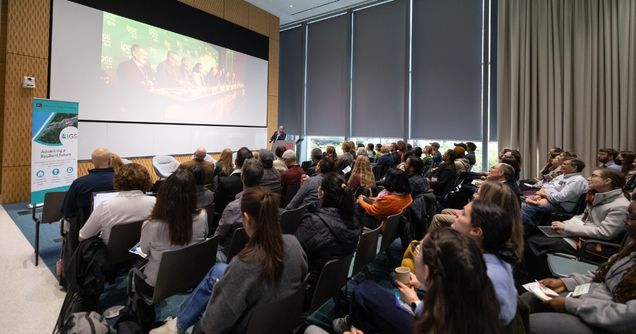Sovacool will co-lead a team of authors to produce the report’s new chapter on “Poverty, livelihoods, mobility and fragility.”
By Alison Gold
Boston University’s Benjamin Sovacool has been selected as a Coordinating Lead Author (CLA) for the upcoming Intergovernmental Panel on Climate Change (IPCC)’s Seventh Assessment Report (AR7). As a CLA, he will serve in one of the report’s senior-most author roles and provide oversight for a new chapter on “Poverty, livelihoods, mobility and fragility.”
Sovacool is the Director of BU’s Institute for Global Sustainability (IGS) and a professor of earth and environment in the BU College of Arts & Sciences. He is among 664 global experts chosen from a pool of 3,771 nominees as report authors and editors for AR7.
The IPCC is widely considered a leading global authority on climate change research. Its Assessment Reports, produced every seven to eight years, synthesize the data and research that governments at many levels need to enact sound climate policies. The reports also play an important role in international climate negotiations. Sovacool served as a Lead Author on the IPCC’s Sixth Assessment Report (AR6), released in 2022. Findings from AR7 are slated to begin appearing in 2028, with the final Synthesis Report anticipated in 2029.
Sovacool announced his new role with the IPCC at IGS’s recent annual gathering.
“I’d like to offer my congratulations to Benjamin Sovacool on his exciting announcement that will further elevate BU’s leadership in global climate science,” Boston University President Melissa Gilliam said in video remarks at the event.
Sovacool shares more about the significance of his new role with the IPCC and how the BU community can get involved.

“I’d like to offer my congratulations to Benjamin Sovacool on his exciting announcement that will further elevate BU’s leadership in global climate science.”
– Boston University President Melissa Gilliam
Q&A with Benjamin Sovacool
What distinguishes the IPCC from other global organizations?
There are six things that make its structure as well as its outputs very different from other types of scientific bodies or research:
- The IPCC only publishes once every seven to eight years. And because of that, it does evidence synthesis rather than research. It creates a kind of synthetic assessment of where we stand on climate change.
- The second thing that’s unique is the IPCC is independent, non-partisan, and unsponsored, which allows us to maintain our dispassionate take on what the evidence says.
- The third thing, because it is an intergovernmental body that does synthesis, it does not actually make policy prescriptions. The instructions they give us is ‘policy relevance,’ rather than ‘policy prescriptive.’
- The fourth thing is that it is a very global body. In my Working Group II on climate adaptation and resilience, I have more than 100 countries represented, in the lead authors or the coordinating lead authors, that put together the report.
- The fifth one is that the IPCC is deeply interdisciplinary. We have climate modelers, atmospheric scientists, physicists, chemists and biologists, alongside sociologists. We have economists, we have political scientists, anthropologists, the whole gamut of disciplines.
- And then the last thing that’s neat about the IPCC is it’s very cross-sectoral. So you’ll have some chapters on buildings or transport. You’ll have other chapters on human behavior, other chapters on land use and farming and agriculture, and other thematic chapters on things like poverty or sustainable development or just transitions and equity.
What are the IPCC “Working Groups,” and which will you help lead?
There are three working groups. The first Working Group I is climate science: What are predictions of virtual temperature change? What about overshoot? What about emissions inventories and data? What about methane and other fluorinated gases beyond CO? Working Group II is on adaptation and resilience. And Working Group III is on mitigating emissions.
Normally, a lot of our work is in that mitigation of emissions. But this time around, I’m in the adaptation and resilience Working Group. I’ll be working on a new chapter on poverty, vulnerability, fragility and mobility. There will be a focus on forced displacement and refugees and violence and conflict.
How can the broader BU community get involved in supporting the IPCC?
There are three ways to contribute.
The first and most important is peer review. When we have our first-order draft in 2026, and our second-order draft in 2027, anyone in the world can register to be an IPCC reviewer and give comments. Just to give this a little bit of perspective, I was a Lead Author in the last report. In our first-order draft, we had 46,125 comments. And we had to reply to them all. So you can be a part of that process. And it is very helpful. Most people only give a few comments. There will be open calls for intellectuals, academics, citizens, people in the NGO sector, people in the private sector, to join and be an actual reviewer.
The second way that you can help is to share your research. If you do research or even write reports that deal with IPCC themes, send them to me. I’d be more than happy to distribute them to some of the other authors and Lead Authors in the IPCC, whether it is on hydrogen energy, waste to energy, building decarbonization, new business models, digitalization, work on EVs, or wind power. All of that fits the IPCC.
And then lastly, one of my jobs as a Coordinating Lead Author will be to nominate Contributing Authors. If you think of someone who might want to volunteer their time next year and in 2027, please recommend them to me. We are actively recruiting Chapter Scientists and Contributing Authors to help with the report.
What comes next as the Working Groups prepare to start drafting the report?
I get to go to Paris, France in December for the first author meeting, where about 800 scholars will convene. And after that, we’ll get started with our Zero-Order draft, which is due in February.
